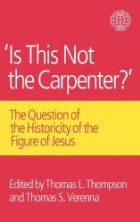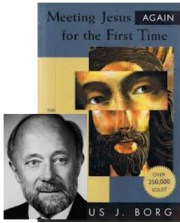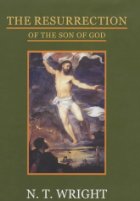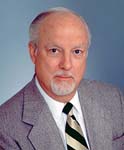 Niels Peter Lemche is the author of the fourth chapter of ‘Is This Not the Carpenter?’, “The Grand Inquisitor and Christ: Why the Church Does Not Want Jesus”. He frames his case around the parable in Dostoyevsky’s novel, The Brothers Karamazov, that tells of Christ being arrested on his return to earth in the time of the Spanish Inquisition. The Grand Inquisitor informs the imprisoned Christ that he will have to be burned at the stake because he is a danger to the Church. But there is a subtle twist in the parable which is the key to understanding the paradoxical argument that follows.
Niels Peter Lemche is the author of the fourth chapter of ‘Is This Not the Carpenter?’, “The Grand Inquisitor and Christ: Why the Church Does Not Want Jesus”. He frames his case around the parable in Dostoyevsky’s novel, The Brothers Karamazov, that tells of Christ being arrested on his return to earth in the time of the Spanish Inquisition. The Grand Inquisitor informs the imprisoned Christ that he will have to be burned at the stake because he is a danger to the Church. But there is a subtle twist in the parable which is the key to understanding the paradoxical argument that follows.
But before starting, let me point out that this post is different from earlier ones discussing chapters of this book. Rather than sequentially paraphrasing the argument I take some core arguments in Lemche’s chapter as a springboard for discussion of my own observations. (So I omit all reference to the origins of historical-critical scholarship, liberation theology and third world exegesis, Philipp Gabler‘s famous lecture on the conflict between historical theology and ecclesiastical dogmatics, the various ways both Catholics and Protestants have historically controlled the reading of the Bible, Marcion’s and von Harnack’s complaints about the inclusion of the Jewish scriptures in the Christian Bible . . . . , that Lemche covers in this chapter.) Now back to the parable. . . .

The parable is told by Ivan Karamazov who appears to side with the Inquisitor in objecting to the Jesus Christ who walks straight out of the pages of the Gospels and begins performing miracles etc just as he did there. (There is much more to the original story, but let’s roll with the details Lemche selects for his analogy.) The irony for Lemche is that this same Ivan also represents those who in other ways question the Church. The Grand Inquisitor thus turns out to be something of a double-edged sword. “Perhaps there are more layers represented in this novel than appear at first sight.”
For Lemche, the Grand Inquisitor represents “the position of the well-educated clergy of the Church“. The threats it faces come from two opposing sides, and one of these sides finds itself in an ambiguous position:
.
Threat #1 — the pious laity with their Bible
Yes, there is the threat from “the pious laity having read too much of the Bible”:
The difference between the Christ of the Church and the Jesus of the Gospels becomes dangerous when explained to the laity. (p. 77)
Elsewhere Lemche has argued that pious people should not be allowed within a hundred metres of the Bible. “Reading the Bible has not done them much good.” Some who would follow in Christ’s footsteps have been rendered harmless by being incorporated into the constraints of the Church itself (e.g. the Franciscans). Others have gone down in history as suicide cults. I and many others would add a vast array of dysfunctional mental, physical, financial and social legacies among too many of the faithful.
I would place John Shelby Spong as the most well-known crusader to save the church from fundamentalism with books such as Rescuing the Bible from Fundamentalism and Why Christianity Must Change or Die. But we also see more mundane scholar theologians like James McGrath fervently battling on behalf of liberal faith and against Creationists and moral-crusaders who take the Bible literally and seriously, with McGrath even opining on his blog more than once the possibility that Creationism is an atheist conspiracy to destroy the church.
(I used to build on Karl Marx’s famous dictum that religion is the opium of the masses by comparing the extremist cults to the heroin faiths (they are literally deadly), the Pentecostal types to the happy marijuanas, and the Anglicans to the mild aspirins. Roland Boer (author of the second chapter of Is This Not the Carpenter? and editor of the book under the “Elsewhere” hyperlink above) has pointed out that Marx’s analogy may not have been as negative as we tend to think today since in the nineteenth century opium was “as valued for its medicinal qualities as denounced for its addictive potential.” Mmm … maybe so, but I wonder if Boer is trying too hard to rationalize his avid interest in both religion and Marxism.)
.
Threat #2 — liberal academic theology and historical-critical study of the Bible
There is also the threat of “liberal academic theology” for its “attack on the central message of the gospel and the confession that God became man.” For indeed, the Jesus reconstructed by liberal academic theology — a presumed historical Jesus — does truly undermine Christianity. But there are some caveats, footnotes and ambivalences . . . . .
Here is where we find the ambivalent position of the Grand Inquisitor. On the one hand the range of “historical Jesuses” constructed by the liberal academic theologians are hardly, I should think, the subjects of many Sunday sermons. The point was made by Earl Doherty when responding to Bart Erhman’s complaint that mythicism threatened to undermine Christianity by “claiming that the figure at the heart of Christian worship and devotion never even existed but was invented, made up, created” (DJE? p. 337). Doherty responded:
But what has Ehrman himself been doing? Is Christianity any more debunked by demonstrating that Jesus did not exist than by demonstrating that he was nothing like the character the Christian faith worships, a failed, somewhat crazy preacher of doom who got himself executed, never to be seen again? Either one would leave it in a “total shambles.”
The expressed point of Ehrman’s outrage in fact rebounds upon him: every “liberal academic theologian” surely knows that “the figure at the heart of Christian worship and devotion” — that is, the Christ of the Gospels, the Christ of faith — is indeed “invented, made up, created”. Every liberal academic theologian that I have read will tell you he never existed.
So we have Ehrman on the one hand undermining Christianity but on the other hand quickly siding to shore up the defences he himself has just assaulted.
Lemche has high praise for the Jesus Seminar, describing it as “a most marked example” in recent times of a historical quest that can be traced back to David Strauss, and “symptomatic of a liberal trend within North American New Testament studies which is unparalleled in North American Old Testament studies” (p. 76). I think we find the same ambivalence with the Jesus Seminar, too.
But is even the Jesus Seminar really “symptomatic of a liberal trend within North American New Testament studies” as Lemche says? Is he not being overly-optimistic? I hope not. But so often I seem to read denigrating remarks among today’s New Testament scholars about the “idiocy” or the “extremism” of the Jesus Seminar. Did the Seminar spark a major reaction against its critical standards? (And even those critical standards did not go so far as to address Bultmann’s work, as Robert M. Price has clearly pointed out.) Some hopefuls, e.g. Spong, have said that the current conservative tide in religious enthusiasm in the United States is its swan song. It knows critical studies are its death-knell. So much optimism! I wish I could share it.
On the other hand, we also know that the Jesus Seminar had its limits.
 Jesus Seminar fellows — liberal academic theologians — like Marcus Borg, John Crossan, John Spong have found through their reconstructed “historical Jesus” a Jesus who is most congenial to their spiritual faith as surely as the Gospel Jesus is to the fundamentalist.
Jesus Seminar fellows — liberal academic theologians — like Marcus Borg, John Crossan, John Spong have found through their reconstructed “historical Jesus” a Jesus who is most congenial to their spiritual faith as surely as the Gospel Jesus is to the fundamentalist.
Why, they’ve found an ordinary frail man of his times just like themselves! The more mundane Jesus of their own reconstructions is especially appropriate for their own forms of “mature” spiritual inspiration. Borg’s Meeting Jesus Again for the First Time epitomizes the sentiments expressed by many liberal scholars who speak of coming to “higher” spiritual or mystical relationships with “another reality” through their “demythification” of the Jesus of the gospels.
Academic theology is pressed into the service of a more sophisticated faith. What concord can faith of any kind have with genuine — that is unlimited — critical inquiry?
There is no denying that even the liberal critical scholars have their own boundaries, as Lemche acknowledges when he writes:
However, there has always been a limit to the liberalism of the Christian laity, the clergy, and the majority of university theologians. If historical-critical scholars came too close to deconstructing the biblical narrative as story and not history; that is, if exegetes dared to question the basic historicity of what was related in the Bible, including certain dogmatic issues, they would immediately have difficulties. (p. 74)
And they do. Within our little internet world of “biblioblogs” one only has to look at James McGrath’s untiring efforts to “prove” that the Bible, especially Paul himself, is anti-discriminatory and all for acceptance into fellowship of gays. If anyone tries to denounce the Bible as being anti-woman or anti-gay watch the liberal theologians jump up with either one of two defences:
- critics are misinterpreting what is written in the Bible, or the context in which it was written;
- critics fail to appreciate that we learn from the Bible to be always growing and maturing in our spiritual understanding, and that is the “true” message of the Bible!
Either way, the Bible must be defended as the foundation of modern liberal values! And not only values, but even modern science. “Liber al theologians” and “critical scholars” are even proudly claiming that the Bible, “properly understood” (according to modern liberal theological studies) does not support Creationism. (One “critical scholar” is even on record as voicing suspicions [see last paragraph] that atheists might even be responsible for the Creationist movement since they are hoping it will make the Bible a laughing stock more generally!)
al theologians” and “critical scholars” are even proudly claiming that the Bible, “properly understood” (according to modern liberal theological studies) does not support Creationism. (One “critical scholar” is even on record as voicing suspicions [see last paragraph] that atheists might even be responsible for the Creationist movement since they are hoping it will make the Bible a laughing stock more generally!)
So much for Hector Avalos’s attempt in The End of Biblical Studies to argue for the practical irrelevance of Bronze and Iron Age texts to today’s world.
When it comes to New Testament historical studies we again find the theological agenda underpinning the “critical scholarship” of liberal theologians. Bart Ehrman and Maurice Casey have irrationally denounced any questioning of the historicity of Jesus as being inspired by atheistic hostility towards religion. (Ehrman and Casey may not be orthodox or even liberal believers themselves, but for whatever personal reasons they clearly do stand up for the fundamental beliefs of liberal theologians.) The extreme reaction from this quarter does not escape Lemche’s notice:
The problem of historical-critical scholarship has always been the selectivity that is involved when it comes to identifying what is really historical and really critical. Historical-critical scholarship usually stops being critical when it does become really historical. Just try to question the historicity of Jesus in front of a group of New Testament scholars! (p. 74)
 Can there be any surprise when the same “critical scholars” welcome among their ranks those who believe they have established historically the resurrection of Jesus (e.g. N.T. Wright)? Many others don’t go quite that far but many resist natural explanations for the accounts of the “Easter experience” in order to preserve some corner in their mind that says: “We can’t understand what happened with our current historical tools and by always leaving this patch unexplored critically we can continue to straddle both (limited) academic studies and (unlimited) faith.”
Can there be any surprise when the same “critical scholars” welcome among their ranks those who believe they have established historically the resurrection of Jesus (e.g. N.T. Wright)? Many others don’t go quite that far but many resist natural explanations for the accounts of the “Easter experience” in order to preserve some corner in their mind that says: “We can’t understand what happened with our current historical tools and by always leaving this patch unexplored critically we can continue to straddle both (limited) academic studies and (unlimited) faith.”
I would also question just how “historical” New Testament scholars really are. Logically flawed “criteriology” has been the primary tool used and unprovenanced documents, ideologically dated and of debatable genre, have been merely assumed to be the products of oral traditions of genuinely historical events.
But the current fracas over mythicism comes on the heels of another heated schism among those biblical scholars specializing in the Old Testament:
Whenever something really new was proposed, trench warfare immediately began, in an attempt to delay the impact of such new ideas concerning, for example, the historicity of Moses or of David, not to mention the patriarchs. (p. 74)
The clearest evidence for this, as Lemche points out, is that one of the general editors of the Copenhagen International Seminar that published ‘Is This Not the Carpenter?’ (as well as another book I discussed earlier on this blog), Thomas L. Thompson, was sent into academic exile for many years from North America for his book questioning the historicity of the patriarchal narratives — a proposition that had been introduced to European scholarship as far back as the early nineteenth century!
.
The true face of traditional historical-critical scholarship
The true face of traditional historical-critical scholarship in general surfaced when, in the last quarter of the twentieth century, a small group of Old Testament scholars began to deconstruct biblical history from one end to the other, thereby exposing the lack of historical foundation for most parts of the historical narratives of the Old Testament. . . . Moving from the patriarchs, every phase of biblical history right down to the story of the Babylonian exile and the return of the Jewish nation to Palestine was shown to be primarily a narrative, though not devoid of historical elements, primarily interested in legitimizing Jewish power in central Palestine. (p. 75)

The vitriolic reaction of academic theologians is epitomized in the tirades against the ‘Copenhagen School’ by North American biblical archaeologist William G. Dever. Lemche notes that in the forward of What Did the Biblical Writers Know and When Did They Know It? Dever gives his game away when he reveals his religious upbringing:
The importance of Sunday school for biblical studies needs to be explored. The kind of religious teaching found in religious institutions has brainwashed children in such a way that only very few will ever be able to break its hold on them. (p. 75)
We can see clearly the religious bias of scholars like Larry Hurtado, Mark Goodacre, Matthew Novenson, James McGrath and a host of others, but what of supposedly “independent” scholars like Maurice Casey, James Crossley, Joseph Hoffmann, Bart Ehrman and company? It might be instructive to know more of their own personal histories.
For example, I understand Maurice Casey’s father was a rector of St Giles Church in Durham and that Maurice took theology as his first degree, lost his faith and then took up classics because he thought it would improve his employment prospects. Is there an explanation here for his staunch defence of Christianity and loathing of “atheists” whom he accuses of denigrating Christian piety despite his own self-exile from the faith? I don’t know, but one does wonder.
We are certainly all products of our cultural environments. It often does take special circumstances to knock some of us into a deeper awareness of the subliminal roots of our belief-systems. And biblical studies is probably among the most ideological of all university departments — it is hardly in the same order of objective study as mathematics and physics. Historical studies are ideological enough without adding religion to the mix.
Not that I think it necessarily takes a religious faith to be ideologically committed to a position on Jesus (or biblical Israel). Both are cultural icons serving a range of political and ideological agendas, not only religious ones. And then there’s simple old social indoctrination, as Lemche mentions when discussing the heritage of Sunday School. Nor let us forget, of course, that there is personal dignity at stake if one is obliged to concede one’s academic life-work might have been based on a faulty assumption.
As I said at the beginning, I have taken Niels Peter Lemche’s chapter as a springboard to my own perceptions of the “state of play”, but I hope I have not deviated too far from Lemche’s central message. I am sure he will correct me if I have.
Neil Godfrey
Latest posts by Neil Godfrey (see all)
- Samaria in the Persian Period - 2024-04-15 11:49:57 GMT+0000
- No Evidence Jerusalem/Judea had a “Writing Culture” in Persian times — Israel Finkelstein - 2024-04-12 09:45:34 GMT+0000
- Questioning the Hellenistic Date for the Hebrew Bible — continuing - 2024-04-11 20:54:16 GMT+0000
If you enjoyed this post, please consider donating to Vridar. Thanks!

The only thing that Christianity needs in order to “be true” is Jesus being raised from the dead. That’s why apologists like WL Craig always focus on the supposed empty tomb and not on the historical reliability of the entire gospel tradition. Jesus could have been a mute who never left his house, but if he was raised from the dead then Christianity is “true”. Paul and the other epistle writers certainly had no use for any preaching or miracles of Jesus, they only cared about him being crucified and raised from the dead.
So if there were no Jesus, then there was no one to be raised from the dead (bodily raised from the dead, even). This in and of itself has more wide-ranging implications. For one, it would be impossible for any professing Christian to think that Jesus didn’t exist. They can do scholarship that concludes that the Christ of faith is an invention, that there were no miracles or even preaching, but they still have to believe that there was a man who came back from the dead. Muslims and Jews even think that Jesus did miracles, but they don’t believe he came back from the dead. That is the dividing line in the sand between Christian and non-Christian (at least modern Christians).
Having a man not come back from the dead is the only thing that “undermines” Christianity. Nothing else. Again, to me, it seems that discussing the historicity of Jesus is a conversation that professing Christians can’t take part in. They’ve already decided before the conversation even began.
Had a chat with my good old colleague Mogens Müller today who is not happy of being called “incompetent.” As a matter of fact as he said, “incompetence” is only when the field is seen from a particular quarter. Like me Mogens is not a member anymore of the historical-critical school in its old shape, but will still call himself a historical critical scholar. Neil definitely has a point here.
I had several points excellently covered here, first of all that large part of the so-called intellectual setup of modern churches may pretent to belong to critical scholarship, but as a matter of fact, scholars from other fields will run screaming away when confronted with what happens here on a regular base, with the dependence in much biblical scholarship on circular argumentation–and, I am sorry, circular argumentation is false, and if a false logic is applied, you don’t need to pay any attention to it anymore: the reason why I say that we can dump two hundred years of so-called critical scholarship.
Everything said about the importance of the environment of the scholar as a child is true. I do not exclaim myself to be an atheist like Philip Davies, as I have no personal demons to fight. As I have said many times, my father was a rather wealthy business man, but you would have to use force to get him to church, My mother liked religion as a theme of conversation but was in no way religious. A lady, really, with a fantastic long life (she became 93). I only wish I knew more about her activities (and my father’s) in the resistance movement. But, as can be seen, absolutely no pressure from home to become a theologian.
Theology is a fantastic field because you can do whatever you want to do. That was the real reason why I started the study of theology. It was not the Bible that brought me to biblical studies, it was Ugaritic (having already in high school started with Gardiner’s Egyptian Grammar). So now you have my personal background.
That I have my ideas can be seen from my “thesis” that the young man in Mark 14 is either Mark or “Q”! If Mark, he spent the rest of his lie creating his Messiah. It only says that there once was a man of the name of Jesus (well, there were a myriad). The historicity of Jesus is a moot question. The important question is how we get from the carpenter to JC. Quite sure that this was also Dostoyevsky’s point, and he really became religious after his visit to Sibiria.
But this is fun, also to incompetent people like Mogens and I!
I’m curious. What was Mogen’s “sin”? (Even Steph Fisher couldn’t speak highly enough of his Son of Man book — though her comment and its related post have been since removed by the head of The Jesus Process for some reason.
Steph’s comments were censored and removed from Hoffman’s site? Wow!
I liked Steph’s claim ‘I wonder if Brett has read anything published by Casey. Probably not. Otherwise he would be aware for example, of ‘From Jewish Prophet to Gentile God’ and ‘Is John’s Gospel True?’ both of which have hardly anything to do with Aramaic at all.’
Of course ‘Aramaic’ appears 57 times in Casey’s work ‘Is John’s Gospel True?’ and there is a whole section called ‘The Aramaic Question’.
There is a certain irony that Steph’s post where she rewrote history was removed , in an attempt to rewrite the history of the blog 🙂
Actually Hoffmann removed the entire post in which he was predicting the soon coming of “Jesus”, the title of Casey’s scholarly demolition of mythicism. Wonder why.
I’m sure I’ve read in a couple of places that the opium of the people simile is due originally to Charles Kingsley (Anglican clergyman and author) but on checking on wikipedia I find that Kingsley’s statement came four years after Marx’s.
Be that as it may, I do not think it is a total attack on religion. It sees religion as both a symptom of oppression and as a protest against it, which is in part true. With the exception of Lenin, who had a visceral hatred of any kind of religiosity, most of the followers of Marx have been cool about religion, and several, including Engels and Rosa Luxemburg, had a soft spot for (aspects of) christianity in particular. And what Marx hated was not for example Quakerism, but the hypocrisy of some Quaker manufactorers.
This remains so in many parts of the world: I remember talking to a taxi driver in Jerusalem and discovering he was an communist, at which I exclaimed that at last I’d met an atheist in his part of the world. No, not so fast, he said, I am also a christian.
Marx’s point was, the slogan on his gravestone, that philosophers have only interpreted the world but the point was to change it. If religion exists because of a weakness of secular political leadership and contradictions in existing society, (the concept of the holy family exists, he said, because of contradictions in the existing earthly family) the it will wither away mainly by building real solutions to social problems, and not mainly by attacking religion head on.
Whether he was right I do not know:religion is not just the anti slavery mentality (opposed to the slave moralities of the Caesar’s and Aristotles of this world) that it in part started as; It had always the other aspects which could be perverted into Carolingian saintliness, inquisition, and the modern fundamentalisms posing as morality or liberation and supported by our bombs. Not opium but blood the drug for that.
As if right on cue one theologian has come out and confessed: “if I went back to first century Palestine and saw Jesus kicking a puppy, that would change my beliefs.” In other words, at the bottom line, his “historical” Jesus is the Gospel Jesus myth — a perfect moral paradigm for all humanity.
The same theologian has given us in the same passage a timely illustration of one sub-theme in this post and a significant point in the previous post concluding Doherty’s response to Ehrman: “my faith is something that is not merely this or that religious belief. . . . . But a loss of faith for me would involve . . . the removal of the conviction that life is meaningful, that there is a purpose and significance to existence.”
Now that faith is an opium — a fix to make life bearable.
This is a perfect example of what Hector Avalos writes:
A few mavericks do from time to time suggest flaws — e.g. Jesus comparing that poor gentile lady to a dog under the table. But no sooner are such suggestions made than there’ll be a flurry of articles demonstrating that no racial slur by today’s standards was conceivable in such a context with such words, etc.
Ditto with Paul — for every homophobic and sexist message he writes there will be many who come to his defence by putting the spotlight on just one or two passages alone that can be interpreted otherwise.
It’s all a “sophisticated” form of proof-texting.
A theologian wrote: “if I went back to first century Palestine and saw Jesus kicking a puppy, that would change my beliefs.”
Neil replied: “In other words, at the bottom line, his “historical” Jesus is the Gospel Jesus myth — a perfect moral paradigm for all humanity.”
What about seeing Jesus cursing at a fig tree (as per gMark). Would that theologian change his faith?
If I were a believer in that kind of Jesus (the “perfect”), that would flip flop mine.
This theologian obviously picks and chooses: what is true is what is goody and not in conflict with sciences & secular history.
Yes, Jesus curses an unripe fig tree… close to a town called “house of unripe figs”.